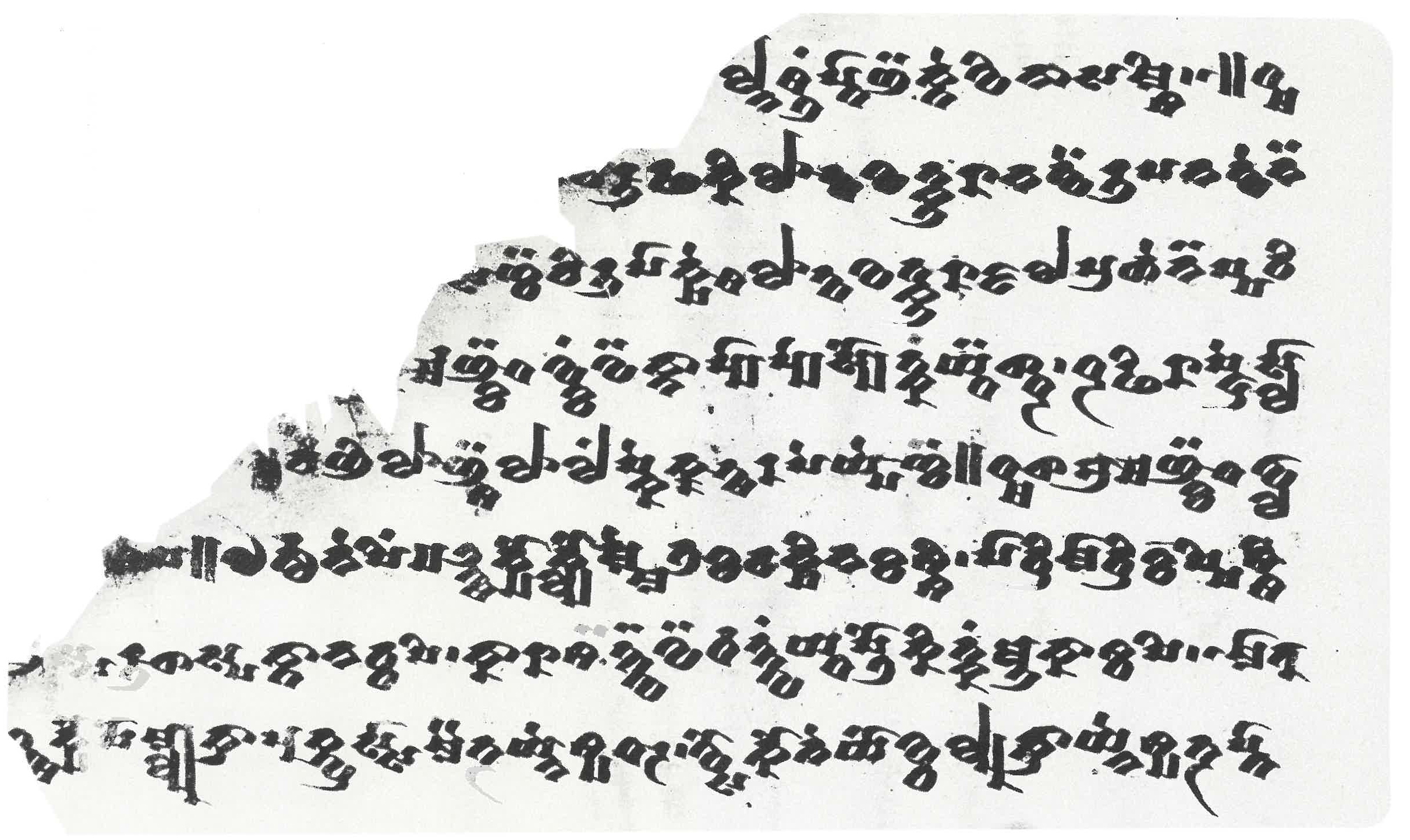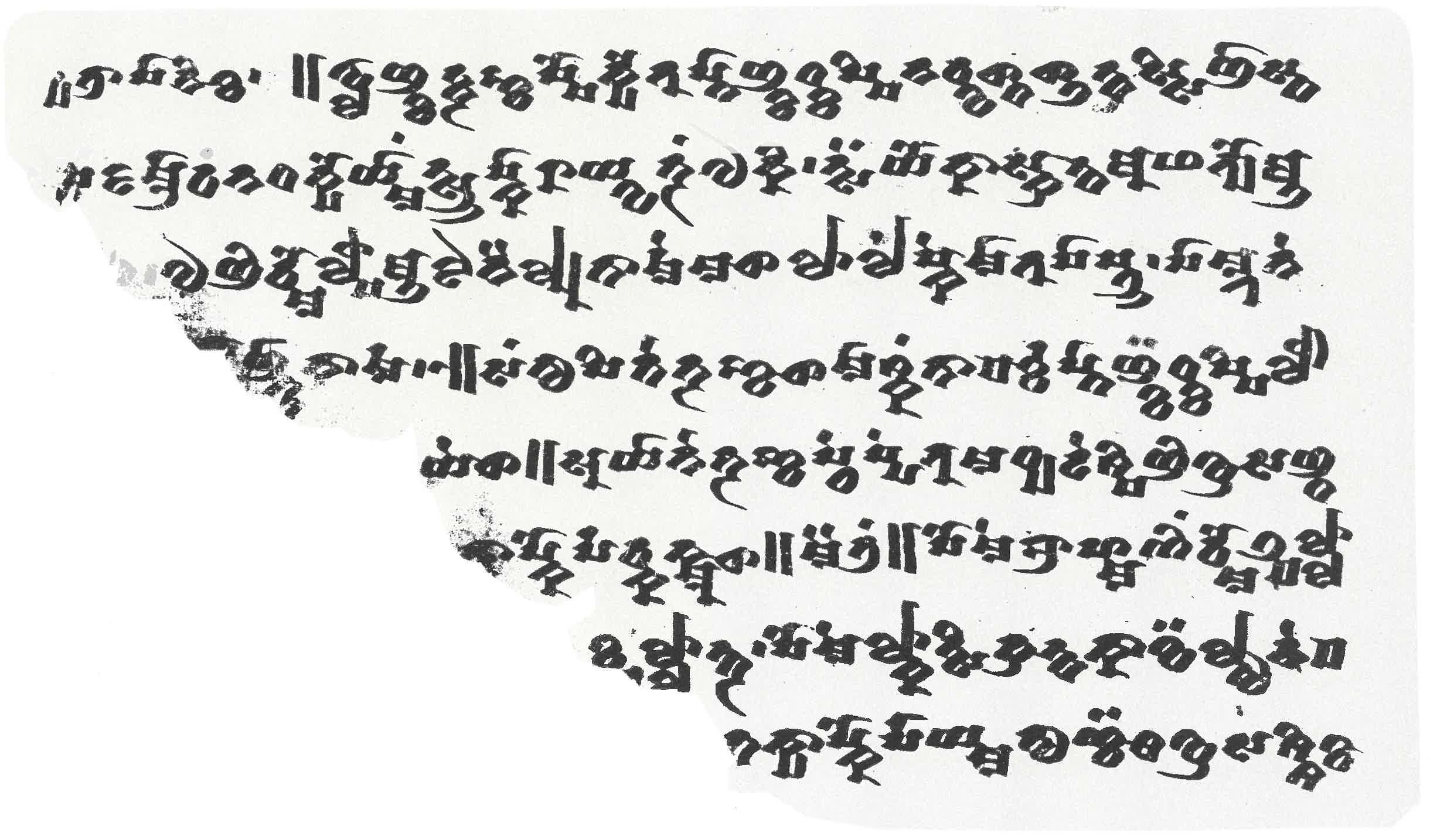| a1 | /// lna slaṃ ptā ñä kte wi nā sa mśi : 1 || tma |
|---|
| a2 | /// [v]· rū ḍha ki lā¯ ¯nt wa tku rā na ndeṃ u pa na nde nä |
|---|
| a3 | /// s·¯ ¯ñcä vi ru pā kṣe¯ ¯s lā¯ ¯nt wa tku rā ja la pra bhe nä ṣṣa ci |
|---|
| a4 | /// [k]·¯ ¯rm ñkä¯ ¯t wkaṃ wä knā pyā pyā syo tkaṃ ytä s̝tra : dhra ḍhi rā ṣṭre slā |
|---|
| a5 | /// [g]· [ndha] rve ñi lā¯ ¯ñśä lā laṃ ṣke kka¯ ¯ts ra pe ype¯ ¯ñcä || tma¯ ¯s̝ bra¯ ¯m ñkä¯ ¯t wlā |
|---|
| a6 | /// [lā] paṃ || o rtu ne ṣiṃ pa ltsa kyo klyo mme tra¯ ¯k da kṣi na ka śśi : pā cri mā cri ka ṣṣi śśi |
|---|
| a7 | /// [ñā] ssa ru¯ ¯s̝ spa ktā na cca ṣi : kā rā śä ntwä wä rta ntwaṃ yta ṣtro ki tkaṃ ā kā śca ṣi : 1 mā nu |
|---|
| a8 | /// [l]tsa kyo ṣo mlyu krā pu kwra ssā mai tra yne śya ta¯ ¯r : wso ko ne yo wcaṃ lyu krā yne śya tra ptā |
|---|
| b1 | /// [ś]ya trā ṣā ni¯ ¯k : 2 || wlā ñka ttra ṅka ṣṣo kyo nu ptā ñka tka ṣṣi na cwa s̝ta s̝la nta ssi ñā sta |
|---|
| b2 | /// [k](·)a ṣiṃ ja rmrā caṃ na ta kyo ymāṃ tsru ṣkā rā ywa traṃ o ki : tseṃ yo kā skra¯ ¯nt a śa nyo ā |
|---|
| b3 | /// [ñi] : o ñi cmo lṣi ā jā nai lyu tā rme ma¯ ¯s̝ lā laṃ ṣke mā nu ṣā ṣtru : ṣā mnu ne |
|---|
| b4 | /// ·ā ñktā kā rme : 1 || saṃ tu ṣi te tra ṅka¯ ¯s̝ mā śkaṃ tā pa¯ ¯rk ptā ñkä tka ṣṣi lo |
|---|
| b5 | /// ye¯ ¯s̝ || su yā ne tra ṅka ṣce ṣpe nu ma dhya de śṣi ñi wra sa ñta |
|---|
| b6 | /// k(·)ā pko rpa cka kmu¯ ¯s̝ || mai traṃ || ṣo me brā hma ṇiṃ cmo lpa llā |
|---|
| b7 | /// kpa llā ntra : ṣo me lkā tsi kra¯ ¯nt kā wä ltu ne pa |
|---|
| b8 | /// tra kyā pko rpā yma tu ñcä¯ ¯s wra sa śśi ka¯ (–) |
|---|
| a1 | 1 |
|---|
| a1 | ... the future ... of the Buddha-god – we venerate you. |
|---|
| a1+ | Thereupon, ... |
|---|
| a2+ | On the order of King Virūḍhaka, ... beginning with Nanda and Upananda, ... (clean?) ... |
|---|
| a3+ | On the order of King Virūpākṣa, ... beginning with Jalaprabha, ... |
|---|
| a4 | ... |
|---|
| a4 | God (Viśva)karman beautifies the ground with all kinds of flowers. |
|---|
| a4+ | (On the order) of King Dhṛtarāṣtra, |
|---|
| a5 | ... the kings of the Gandharvas play, very softly indeed, music. |
|---|
| a5+ | || Then, God Brahmā (says to God) Indra: |
|---|
| a6 | ... In the (Nandavi)lāpa [tune] || With friendly thought the noble Metrak (paid his respect) to receivers of gifts, to father and mother, to teachers ... |
|---|
| a7 | 1. |
|---|
| a7 | ... have called forth to the desire for his service. In jungles and woodlands are earth and sky adorned for him as it were. |
|---|
| a7+ | Not, however, ... |
|---|
| a8 | ... in his mind, he shows, in first place, kindness to all beings; |
|---|
| a8+ | in the second place, in his joyfulness, he shows ... (to the) Buddha(god the teacher) ... |
|---|
| b1 | 2 || |
|---|
| b1 | ... he shows, the venerable one. God Indra says: |
|---|
| b1+ | His desire to go away from the house and to go to the Buddha-god the teacher has become very strong. |
|---|
| b2 | ... the topknot of (blue) hair on his head is leaning a little to the back as it were since he is moving forward pushing hard; |
|---|
| b2+ | with his beautiful blue eyes, ... |
|---|
| b3 | ... (his) body: human, of noble descent, exceedingly delicate, but not tired. |
|---|
| b3+ | (With the wish) for monkhood, ... by the Buddha-god the truth. |
|---|
| b4 | 1 || |
|---|
| b4 | Saṃtuṣita says: |
|---|
| b4+ | No longer (is) the Buddha-god the teacher now far away. |
|---|
| b5 | ... has gone ... || Suyāna says: |
|---|
| b5+ | The people of the Madhyadeśa, too, ... (like a) cloud ... having come to the presence of ... Metrak. |
|---|
| b6 | || In the Maitär [tune] || |
|---|
| b6+ | Some praise (his) brahmanic descent, |
|---|
| b7 | ... praise his thinking; |
|---|
| b7+ | some praise his beautiful appearance; |
|---|
| b8 | ... of the beings moving ... toward Metrak hundred(fold?) |
|---|
| n2 | Cf. MaitrHami 2, 8 b28ff., and the last line of this leaf corresponds to MaitrHami 2, 10 a5ff. (for the Uy. references cf. Ji et al. 1998: 18). |
|---|
| n3 | Cf. MaitrHami 2, 9 a2ff. |
|---|
| n4 | Cf. MaitrHami 2, 9 a9ff. |
|---|
| n5 | Cf. MaitrHami 2, 9 a15ff. |
|---|
| n6 | nandavilāpaṃ: two stanzas of 4 x 15 (7/8) syllables. |
|---|
| n7 | kārāśäntwä: this form is a mistake for kārāśäntu ('in the wilds and the woodlands') or, less likely, kārāśäntwaṃ ('in the wilds and in the woodlands'). The mistake is probably due to the next word, which starts with wä. |
|---|
| n8 | Cf. MaitrHami 2, 9 b2ff. |
|---|
| n10 | Cf. MaitrHami 2, 9 b17ff. |
|---|
| n11 | The Uyghur text has the name Suyāma, borrowed in the form suyami, MaitrHami 2, 9 b21. |
|---|
| n12 | maitraṃ: two stanzas of 4 x 12 (5/7) syllables. |
|---|
| n13 | Cf. MaitrHami 2, 10 a1f. |
|---|
Ji, Xianlin, Werner Winter, and Georges-Jean Pinault. 1998. Fragments of the Tocharian A Maitreyasamiti-Nāṭaka of the Xinjiang Museum, China. Transliterated, translated and annotated by Ji Xianlin in collaboration with Werner Winter, Georges-Jean Pinault. TLSM 113. Berlin/New York: de Gruyter.
Pinault, Georges-Jean. 1999. “Restitution du Maitreyasamiti-Nāṭaka en tokharien A: Bilan provisoire et recherches complémentaires sur l’acte XXVI.” Tocharian and Indo-European Studies 8: 189–240.
Sieg, Emil, Wilhelm Siegling, and Wilhelm Schulze. 1931. Tocharische Grammatik. Göttingen: Vandenhoeck & Ruprecht.




